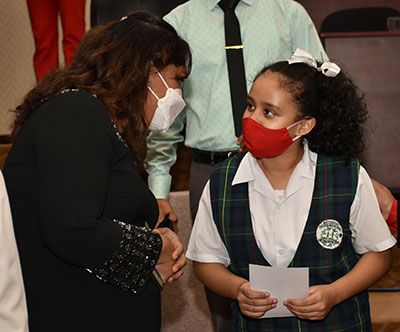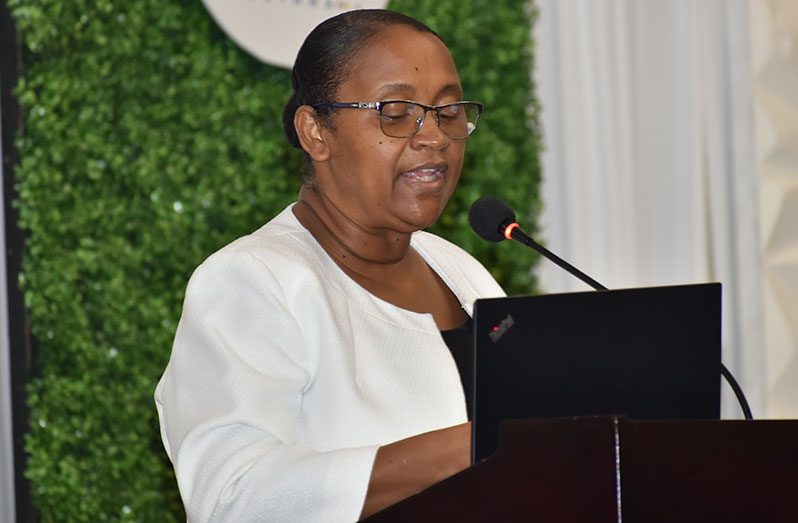EVEN amid a global pandemic, the pupils who sat this year’s National Grade Six Assessment (NGSA) have managed to do quite well. As a matter of fact, subject areas such as English Language and Social Studies have even recorded the highest pass rates since 2018.
This is according to Dr. Nicole Manning, the Operations Director at the Caribbean Examinations Council (CXC), which was, for the first time ever, given the responsibility of administering the local assessment.

An official ceremony was hosted on Friday at the Arthur Chung Conference Centre, at Lilliendaal, Greater Georgetown to announce the country’s top students. There, it was reported that of the 14,380 pupils who registered for NGSA 2021, only 13,822 actually showed up to sit the examination, which encompassed a consolidated syllabus of four core subject areas: English Language, Mathematics, Social Studies and Science.
This means that 559 pupils who were eligible to take the secondary school placement tests did not do so. The examinations were written on August 4 and 5 at 503 centres across the country.
In her report, Dr. Manning said that English Language amassed the highest pass rate since 2018, followed by Social Studies, Science and Mathematics.
In relation to English, more than 65.71 per cent of the pupils passed the subject in 2021. This represents a notable jump from the 60.6 per cent passes recorded in 2018, the 57.45 per cent passes recorded in 2019, and the 61.22 per cent pass rate of 2020.
“We had a very significant increase of 142 candidates scoring full marks for English, and an increase in the number of candidates scoring zero; not a great increase, but an increase,” Dr. Manning said.
She explained that it was important for CXC to record the number of pupils who scored zero, since such key information could be used to inform the Ministry of Education’s work going forward.
Similarly, Social Studies recorded a pass rate of 56.3 per cent, which is significant improvement when compared to the 46.08 per cent pass rate recorded in 2018, the 37.22 per cent recorded in 2019, and the 52.51 per cent passes of 2020. Social studies also had the highest number of candidates scoring full marks, and lowest number of candidates scoring zero.
For Mathematics, Dr. Manning said that this year saw low performances, with the pass rate pegged at 36.5 per cent as compared to 39.43 per cent in 2020, 42.04 per cent in 2019, and 38.28 per cent in 2018. “We had one candidate scoring full marks for 2021, and we had 10 candidates scoring zero marks. While it was not the highest in the last four years, it is, indeed, I’m sure, something that the ministry will be managing,” Dr. Manning posited.
Science, according to Dr. Manning, also showed a decline, with passes being recorded among 40.12 per cent of the pupils who wrote the examinations.
The pass rate for science in 2020 stood at 44.09 per cent, followed by 42.45 per cent in 2019, and 46.84 per cent in 2018. Additionally, only one pupil managed to secure full marks for science, while nine scored zero, similar to the 2018 results.
GENDER DISTRIBUTION
Meanwhile, Dr. Manning’s comprehensive report also outlined the gender distribution of the examinations, which indicated that the majority of the top performers were female. More specifically, the top performers accounted for seven females as against three males.
The figures, as presented by Dr. Manning, indicated that 3,457 pupils showed an average performance of below 75 per cent. Of those candidates, 2,281 were males, and 1,176 were females.
The reports indicated that 3,459 of the pupils performed below the 50 per cent average; that 1,664 of them were males and 1,795 females.
For those performing better than 50 per cent of the candidate population, 1,518 were males, while 1,938 were females. Notably also, were the 3,455 candidates who performed above the 75 per cent average; 1,547 of them were males, while 1,980 of them were females.
Nonetheless, reflecting on the results, Education Minister Priya Manickchand said that it is important to note that the examinations were written at a time when pupils, parents and teachers were all grappling with the trauma, loss and heartaches that have surrounded the coronavirus pandemic.
She reasoned that prior to the pandemic, “We didn’t know we would lose family members; we didn’t know we’d be in grief; we didn’t know that the basic things that we are accustomed to in this warm, sunny tropical Guyana – going outside playing with friends, having birthday parties… we didn’t realise that all of that would be so severely interrupted and that has had an impact on everybody.”
Minister Manickchand said that the 2021 NGSA candidates chose to write the examinations, even though they had been out of school for many months. She said that the Ministry of Education tried its best to ensure that all pupils were equipped with the necessary tools to take the exams.
Minister Manickchand also called on all parents, teachers and pupils to congratulate themselves for manoeuvring many months of unprecedented challenges to be able to complete this year’s NGSA.
WHY CXC ADMINISTERED NGSA
Additionally, commenting on CXC’s involvement in administering the local examinations, Minister Manickchand indicated that this had been in conversation since 2013, and stemmed from the fact that during previous years, marks given to pupils were found to be inconsistent with NGSA’s grading criteria. “What we were seeing were results that didn’t match professional measurement and evaluation,” Minister Manickchand noted.
As a result, the minister said that an independent body as reputable, and as capable as CXC was needed to run the examinations. “We made special efforts to make sure CXC ran the entire programme of NGSA and managed it,” the Education Minister noted.
She pointed to the fact that CXC is a Caribbean Community (CARICOM) body that has expertly executed a number of regional examinations.
Nonetheless, Assistant Chief Education Officer, Ameer Ali, who also spoke at the ceremony, recognised the determination of the children, parents and teachers, who all braved the adverse conditions associated with COVID-19 to take, facilitate and support the examinations.



.jpg)









